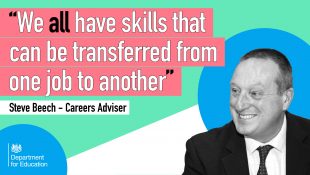
This National Careers Week, careers adviser Steve Beech talks about the importance of transferable skills, and what you can do to optimise your career options and employability.
Steve Beech, NVQ Level 4 Qualified Careers Adviser
The pandemic has resulted in many redundancies, companies closing and jobs changing. What do you do if the job you have always done is no longer an option, and you need to find some other kind of work?
Some people might panic, and not know what to do, or where to seek advice. I am here to tell you that we all have skills that can be transferred from one job to another, even if that job is very different to the jobs that we have done before. All you need to do, is identify your transferrable skills and use them in your application for a new role. Here’s how.
Stop and think! Identify your transferable skills
Think carefully about the jobs that you have done before, what you did in those jobs and - most importantly - what you enjoyed the most there.
Perhaps you enjoyed working with your hands, communicating with people, caring for others, solving problems, using computers (IT skills), or selling products. These are your transferable skills!
We don’t only build transferable skills through work. We also develop these skills through education, training courses, our hobbies, our interests, and in our everyday life. Over the years, I have offered my advice to many parents who felt that they lacked the skills necessary to find the work they want. What many of them didn’t realise, is that parenthood itself enables the development of a multitude of skills. Food preparation, budgeting, mentoring, and communication, are all skills that you can effectively transfer to a new role.
It is important that you can identify and give examples of the transferable skills that you have developed in a job application. This will go a long way to persuading prospective employers that you are right for the job.
Research the job opportunities that are out there
Start by finding out what jobs are available in your area. You can search using well-known jobsites, but it is important not to narrow your search criteria too much. Rather than searching for a specific job title or sector, try putting in just your postcode.
You will then be able to view all the available jobs, in all sectors, that are available in your area. Look through all those jobs and think about whether you feel you can or would want to do that job. Consider the transferable skills you have built in your previous jobs (see point 1) – can you apply those skills of any of these jobs? If the answer is “yes” and the job sounds interesting, then apply for it!
Highlight your skills in your application
When you’re applying for a specific role, make sure that you read the job description thoroughly, and identify the skills that the employer wants. Then, make sure that you match these skills with your own transferable skills and include them in your CV or application. You should always tailor your CV to suit each job description and company.
If you aren’t sure about your transferable skills, get help
Many people struggle to identify their skills on their own, particularly if they are looking to change career. If this is something you’re finding difficult, get a second opinion! Why not show the job description to someone close that you know and trust and ask them: “What do you think? Do you feel that I am a good match for this job?” If the answer is “Yes!”, then apply!
I’d also recommend that you complete a skills assessment or skills health check on the National Careers Service website. The skills assessment will help you to consider questions about the things you like to do or are good at. Going through that process can help you learn more about your personal and work-based skills, and then match them to potential new careers. The information can also be helpful if you're applying for a job or preparing for an interview.
Finally, you can contact the National Careers Service for 1:1 support and advice. The National Careers Service provides free, up to date, impartial information, advice and guidance on careers, skills and the labour market in England to anyone aged 13 and upwards. To speak to a National Careers Service adviser, call 0800 100 900 or visit nationalcareers.service.gov.uk.
Other resources for careers advice and career development
The UCAS website offers a range of careers resources, including a careers quiz, tips on getting a job, and useful information about employment and contracts,
The Skills Toolkit offers a whole host of free, online courses allowing you to expand your skillset and change jobs. Courses range from coding to digital marketing, maths, design, and business management.